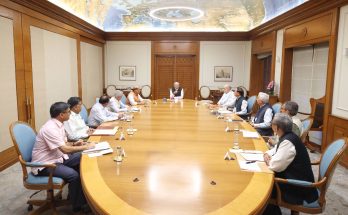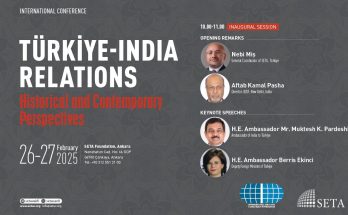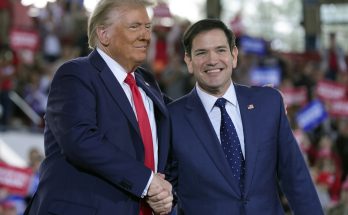 Three countries, four multilateral summits, meetings with over 40 leaders of the world, spanning continents and diverse geographies, including Asia, Africa, Europe, North America, South America and Pacific Region. And all this in 10 days! If this sounds like fantastic and humanly impossible, weigh in again. This is India’s speed diplomacy cruising along in high gear as Prime Minister Narendra Modi heads on a 10-day overseas tour that’s going to underline New Delhi’s commitment to multilateralism and its proactive thrust to shape an emerging world order.
Three countries, four multilateral summits, meetings with over 40 leaders of the world, spanning continents and diverse geographies, including Asia, Africa, Europe, North America, South America and Pacific Region. And all this in 10 days! If this sounds like fantastic and humanly impossible, weigh in again. This is India’s speed diplomacy cruising along in high gear as Prime Minister Narendra Modi heads on a 10-day overseas tour that’s going to underline New Delhi’s commitment to multilateralism and its proactive thrust to shape an emerging world order.
Barely five months after he took charge as the leader of the world’s largest democracy, Mr Modi has made an impressive debut on the world stage with headline-hogging successful visits to Japan and the US and hosting the leader of China in between these two big-ticket trips. He also surprised the world by his diplomatic masterstroke of inviting the leaders of South Asia at his swearing-in ceremony, a gesture that underscored his neighbours first policy and signalled his political will to build bridges with Pakistan. While open to diplomacy and accommodation, Mr Modi has also drawn red lines with both Pakistan and China, suggesting that while his government is ready to walk the extra mile, others have to create a hospitable terrain and atmosphere so that the leaders can walk, and walk the talk.
Multilateralism: Multiple global challenges
Now, with his three-nation tour that includes three multilateral summits – the India-ASEAN and East Asia Summit in Myanmar (Nov 12-13) and G20 summit in Australia (Nov 15-16), Prime Minister Modi looks poised to display a deft multilateral diplomacy and reaffirm India’s commitment to multilateralism that was questioned by many after New Delhi stood globally marginalised following its refusal to play along with the Trade Facilitation Agreement at the WTO. In a departure statement ahead of his trip, PM Modi has summarised some key themes of his longest overseas trip. First, he spoke about multiple global challenges and underscored national development and resurgence as the driving force of India’s diplomacy. “These meetings are taking place at a time of multiple global challenges. I look forward to seeking a global environment that supports our aspirations for economic development and a peaceful world.” Besides the multilateral summits, Modi is expected to meet a host of leaders for bilateral meetings, including, among others, British Prime Minister David Cameron, French President Francois Hollande, Russian President Vladimir Putin, US President Barack Obama and Chinese Premier Li Keqiang.
Act East: Shaping Regional Architecture
 Placing ASEAN at the core of India’s Act East policy and the dream of an Asian century, the prime minister spoke about “many challenges as the region spanning the Indian Ocean, continental Asia and Pacific Ocean.” In the larger East Asia region which has borne the brunt of Chinese assertiveness, it was a veiled allusion to the region’s potential and dynamism degenerating into compulsive feuding and petty rivalries. “At the East Asia Summit, I look forward to discussing with ASEAN and seven global leaders how we can strengthen regional institutions, international norms and regional cooperation in pursuit of peace, stability and prosperity.”
Placing ASEAN at the core of India’s Act East policy and the dream of an Asian century, the prime minister spoke about “many challenges as the region spanning the Indian Ocean, continental Asia and Pacific Ocean.” In the larger East Asia region which has borne the brunt of Chinese assertiveness, it was a veiled allusion to the region’s potential and dynamism degenerating into compulsive feuding and petty rivalries. “At the East Asia Summit, I look forward to discussing with ASEAN and seven global leaders how we can strengthen regional institutions, international norms and regional cooperation in pursuit of peace, stability and prosperity.”
G20: Growth and infrastructure
At the G20 summit, Mr Modi pithily encapsulated India’s core goals as “global economic growth and stability, stable financial markets and global trading regimes and employment generation.” He spoke about India’s development priorities and enlisted the global support for accelerating “the creation of next generation infrastructure, which also includes digital infrastructure, and ensure access to clean and affordable energy.” With an eye on his domestic constituency, he promised that he would highlight the importance of international cooperation against black money.
On the bilateral track, PM Modi has struck an upbeat note about his four-city, three-day visit to Australia – the first prime ministerial visit from India in nearly three decades. Again, the emphasis was on forging partnerships to promote common economic goals and shared strategic interests. “A closer strategic partnership with Australia will support India`s economic goals; promote our security interests, including maritime security; and, reinforce our efforts to foster a climate of peace and stability in our extended continental and maritime neighbourhood,” he said.
Fiji: Pacific Bonding
 Mr Modi ends his 10-day trip with a visit to Fiji, the picturesque Pacific island country that is home to a large Indian diaspora and is trying to refashion itself as a democracy. This will be the first prime ministerial visit from India to Fiji after 33 years. Talking of high-speed diplomacy, the Modi regime has shown ambition and imagination by leveraging the one-day visit of the prime minister to get the island nation to organise a meeting with leaders and representatives of 12 Pacific Island nations at such a short notice.
Mr Modi ends his 10-day trip with a visit to Fiji, the picturesque Pacific island country that is home to a large Indian diaspora and is trying to refashion itself as a democracy. This will be the first prime ministerial visit from India to Fiji after 33 years. Talking of high-speed diplomacy, the Modi regime has shown ambition and imagination by leveraging the one-day visit of the prime minister to get the island nation to organise a meeting with leaders and representatives of 12 Pacific Island nations at such a short notice.
By the time Mr Modi returns home, he would have met leaders of most of key developed, developing and emerging countries in the world. This is no PR puffery of India’s foreign office, but this is fast-track diplomacy, with skill, focus and panache. The challenge will be to sustain the momentum and build on the initial energy generated in these multi-pronged engagements. As John Chipman, who heads IISS, UK’s leading think
tank, says presciently in today’s globalised world, it’s not so much hard power or soft power that matters, but the speed with which nations act to promote their economic and strategic interests.
Author Profile

- Manish Chand is Founder-CEO and Editor-in-Chief of India Writes Network (www.indiawrites.org) and India and World, a pioneering magazine focused on international affairs. He is CEO/Director of TGII Media Private Limited, an India-based media, publishing, research and consultancy company.
Latest entries
 India and the WorldApril 21, 20253T Template for India-US Mega Partnership
India and the WorldApril 21, 20253T Template for India-US Mega Partnership India and the WorldFebruary 14, 2025Modi-Trump COMPACT: India, US launch MEGA partnership for 21st century
India and the WorldFebruary 14, 2025Modi-Trump COMPACT: India, US launch MEGA partnership for 21st century India and the WorldJanuary 28, 2025Modi, Trump talk global peace, focus on strategic connect
India and the WorldJanuary 28, 2025Modi, Trump talk global peace, focus on strategic connect India and the WorldDecember 16, 2024Kazan Spirit: India, China SRs to hold talks in Beijing
India and the WorldDecember 16, 2024Kazan Spirit: India, China SRs to hold talks in Beijing







